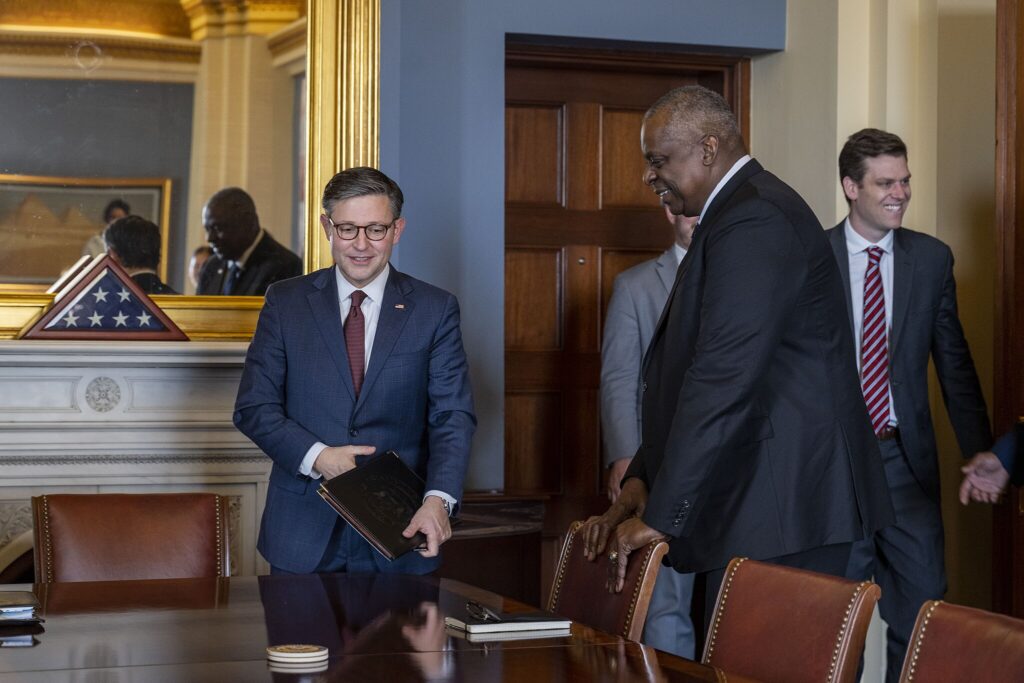
House Speaker Mike Johnson (R-La.) finally threw in the towel last week, relying on Democrats’ votes in the House Rules Committee to propel a long-stalled foreign aid bill for Ukraine, Israel, Gaza, and Taiwan to the House floor. Most striking in that measure was aid for Ukraine: Every Democrat voted for it, over the objections of more than half of the Republican conference. Those opponents included Johnson’s hardliner foes on the far right. The aid package is now back in Senate hands and likely headed to the president’s desk early this week.
Speaker Johnson’s transformation from opposing to facilitating House passage of aid for Ukraine has attracted the lion’s share of media attention to this bill. Most observers suggest a mix of personal and political forces changed Johnson’s mind after months of dragging his feet. That’s likely true, but let’s not miss the institutional and electoral forces motivating Johnson’s move.
Where you stand depends on where you sit
Start with Miles’ Law, surely the most well-known aphorism uttered by a federal budgeteer. As a manager in the Federal Bureau of the Budget in the 1940s, Rufus E. Miles, Jr. coined the eponymous phrase to capture a simple notion: One’s views and positions cannot be divorced from the institutional perch in which they sit. We see this dynamic throughout politics: Senators, for example, can oppose banning the filibuster when they serve in the minority party, but flip to wanting to get rid of it when they gain the majority.
In Johnson’s case, he voted several times against emergency supplemental aid for Ukraine as a rank and file House GOP conservative in 2022 and 2023 – consistent with GOP voters’ and former President Trump’s isolationist position opposing aid. But after becoming Speaker, Johnson pivoted – privately at first and then publicly – to suggesting the U.S. should aid Ukraine.
Why the conversion?
Keep in mind that voters typically reward lawmakers for positions they take, rather than the outcomes that result. Johnson’s votes against Ukraine were just that: positions. We can never know for sure lawmakers’ underlying preferences on a particular matter. Elevated to the speakership, a new set of forces surely shaped Johnson’s eventual public commitment for Congress to aid Ukraine.
What might have changed in his new position?
First, Johnson became the key lightning rod for political pressure – from colleagues, senators, the president, international heads of state, the president of Ukraine himself, among many others. Second, access to high-level intelligence – and Johnson’s willingness to believe it – reportedly helped to solidify a sense of urgency. Third, roughly half of his GOP colleagues favored aid. And reports suggest some would sign Democrats’ discharge petition to propel the Senate-passed package to the House floor, which would have thoroughly undermined Johnson’s leadership. Fourth, Johnson’s efforts to engineer procedural steps to attract far-right votes – including repacking aid as loans and adding a bill to ban TikTok – only further enraged GOP hardliners.
True, it took months for Johnson to finally turn to Democrats for critical votes. But Johnson’s new institutional vantage point surely contributed to his seeming conversion on aid to Ukraine.
Enduring foreign policy bipartisanship
New work by political scientist Jordan Tama makes plain the persistence of congressional bipartisanship in foreign policy. Most important, even when partisans polarize over many domestic policy areas, Tama demonstrates that lawmakers often cooperate on international affairs. Such bipartisanship can come in various forms. A bipartisan coalition can support or oppose the president’s position. (That seems to go for former presidents’ positions too.) And intra-party divisions – in one or both parties – can emerge over foreign policy matters.
Tama’s key insight is that countervailing forces can break up the dominant left-right partisan cleavage that characterizes many of today’s coalitions on domestic policy. Institutional positions matter. Voters tend to hold presidents, more than legislators, accountable for foreign policy decisions – creating leeway for lawmakers when they vote. Organized interests can vary in their attention to and positions on different international issues, and liberal and conservative positions are not always clear on issues such as trade liberalization or humanitarian assistance. These sorts of forces shape electoral pressures on legislators and can spur bipartisan cooperation, suggesting again that more than Speaker Johnson’s personal commitments mattered.
Political time
Don’t underestimate the effect of international events and crises to shake up political calculations. In this case, Iran’s unprecedented direct attack on Israel, rather than through its many regional proxies, changed the political landscape for considering the aid package.
As John Kingdon argued decades ago, when policy problems, proposed solutions, and political events collide, a window of opportunity for policy change can open. In this case, the Iranian attacks increased pressure on Republicans to advance aid for Israel (and with it, humanitarian assistance for Gazans of importance to progressive Democrats). That pressure seems to have offered Johnson the political cover he craved to finally move on the broader foreign aid package – even over the objections of more than half of his GOP colleagues on Ukraine aid. House leaders advanced a set of procedural steps in the House Rules Committee that pinned the blame for inaction on three pivotal hardliners in the committee, and finally turned to Minority Leader Hakeem Jeffries (D-N.Y.) and the Democrats to save aid for Ukraine from their party’s historic dysfunction.



